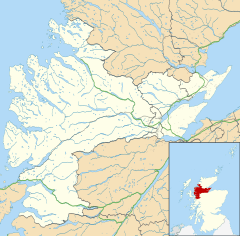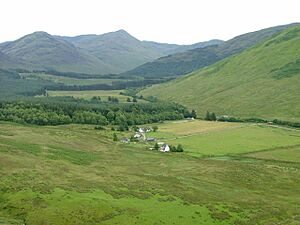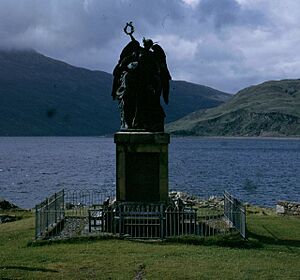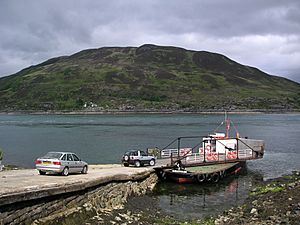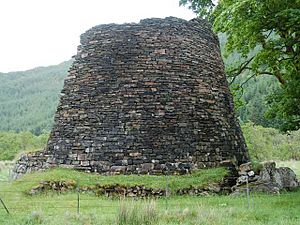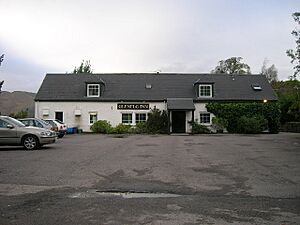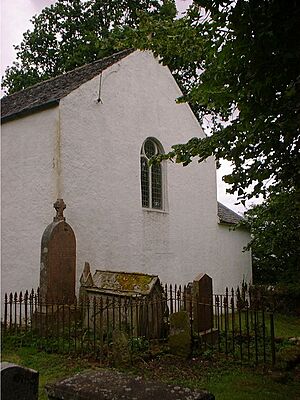Glenelg, Highland facts for kids
Quick facts for kids Glenelg
|
|
|---|---|
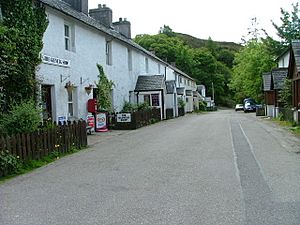 Glenelg with village shop at left, part of a category B listed building |
|
| Population | 1,507 (2001) |
| OS grid reference | NG8119 |
| Civil parish |
|
| Council area | |
| Lieutenancy area | |
| Country | Scotland |
| Sovereign state | United Kingdom |
| Post town | KYLE |
| Postcode district | IV40 |
| Dialling code | 01599 |
| Police | Northern |
| Fire | Highlands and Islands |
| Ambulance | Scottish |
| EU Parliament | Scotland |
| UK Parliament |
|
| Scottish Parliament | |
Glenelg (which is Glinn Eilg in Scottish Gaelic) is a small, spread-out community in the Highland region of western Scotland. It's also a civil parish, which is like a local area for government.
The main village in Glenelg is called Kirkton of Glenelg. Most people just call it "Glenelg." There's also a smaller group of houses nearby called Quarry, right by the sea. You'll find other groups of homes scattered around, including in the valleys of Glen Beag and Glen More. The whole parish of Glenelg is quite large. It includes areas like Knoydart and Mallaig, which is a ferry port. In 2011, about 291 people lived in the Glenelg and Arnisdale community.
Contents
- Exploring Glenelg's Location and History
- The Glenelg Ferry: A Unique Journey
- Things to See and Do in Glenelg
- Local Services and Community Life
- Glenelg Amateur Football Club
- What Does "Glenelg" Mean?
- Glenelg's Connection to Mars
- Sandaig and Camusfeàrna
- Famous People Connected to Glenelg
- Images for kids
Exploring Glenelg's Location and History
Glenelg is located south of Loch Alsh. It's very close to the Isle of Skye across a narrow stretch of water called Kyle Rhea. This spot has strong tides.
How to Get to Glenelg
From November to February, the only way to reach Glenelg is by road. You have to drive over the Mam Ratagan pass, which is 339 meters (1,112 feet) high. People often call this pass "the Bealach." It connects Glenelg to Shiel Bridge, which is on the main road from Inverness to Skye.
After crossing the Mam Ratagan, the road goes gently down into Glenelg through Glen More. This means "big valley" in Gaelic. There's another valley nearby called Glen Beag, meaning "small valley."
Glenelg's Past Importance
Because it's so close to Skye, Glenelg used to be a very important place for travel and trade. It had many more people living there in the past. For example, it appeared on the first map of Scotland made in 1662.
Cattle from the outer islands were brought to Skye. Then, they were herded south to Kylerhea village. From there, they would swim across the 534-meter (1,752-foot) strait to the mainland. They were tied together, nose to tail, and guided by a small boat. After swimming, the cattle were driven along a special "drovers' road" through Glen Beag. This road led them to markets in places like Stirling and Falkirk in the Scottish Lowlands.
Military History of Glenelg
After a rebellion in 1715, Glenelg was chosen as a site for a military barracks. This was one of four such places built in the Scottish Highlands. These barracks were finished in 1725. A military road was soon built to connect Glenelg to other army roads.
However, these barracks didn't stop another rebellion in 1745. They also weren't needed after the Highland Clearances, when many people were moved off the land. Today, the Bernera Barracks are just ruins.
A war memorial was put up in Glenelg in 1920 to remember those who served. If you're from Glenelg, you're called an Eilgeach in Gaelic.
The Glenelg Ferry: A Unique Journey
From March to October, a small vehicle ferry connects Glenelg to Kylerhea on Skye. This ferry crosses the strong currents of the Kyle Rhea narrows.
About the Ferry Boat
The ferry used since 1982 is called the MV Glenachulish. It's special because it's the last hand-operated steel turntable ferry still working in the world! It was built in 1969.
The ferry can carry six cars and also foot passengers. It's unusual because the ferry docks alongside the slipway. Then, the crew manually turns the deck, which is built on a turntable. This allows cars and passengers to get on and off easily. The ferry service stopped in 2020 because of the COVID-19 pandemic. But it started again on May 1, 2021.
The ferry slipway at Glenelg was designed by a famous engineer named Thomas Telford in 1818. It's now a historic site.
Things to See and Do in Glenelg
The ferry itself is a popular tourist attraction. Another exciting sight in recent years is a pair of sea eagles that live here. During the summer, you can often see them fishing near the ferry crossing as they feed their young.
Ancient Brochs of Glenelg
Glenelg also attracts visitors to the remains of two of the best-preserved brochs on mainland Scotland. Brochs are ancient stone towers built by people long ago. These two, called Dun Telve and Dun Troddan, are located in Glen Beag. They are about three miles further along the road from the main Glenelg village.
Local Services and Community Life
The community's only pub is the Glenelg Inn. This inn stands where an older hotel used to be. That hotel had marble floors but burned down in 1946.
Glenelg also has a village shop. There's an organic market garden and a cafe in Glen Beag. You can also find a seasonal cafe in the Glenelg Village Hall in Kirkton. Local businesses offer services like bicycle hire and repair.
The Glenelg Parish Church of Scotland has parts that are from the 1700s. It has been repaired and updated several times over the years. Today, it's part of a larger group of churches in the Lochalsh area. Other churches, like the Glenelg Free Church of Scotland, also meet in the area.
Glenelg Amateur Football Club
Glenelg Amateur Football Club is known by locals as "The Duffers." The team was started again in 2011 by Grant MacLeod. In 2019, Glenelg FC won the Clan Donald Cup. This was their first trophy in over 43 years!
What Does "Glenelg" Mean?
The name "Glenelg" now refers to the whole area. However, it probably first referred only to the valley where the ancient brochs are. The "Eilg" part of the name is found in other places too, like Elgin. It's thought to be an old word for Ireland. This shows that Gaelic settlers used to name new places after their old homes, just like we have New York or New Caledonia today.
The name "Glenelg" is also special because it's a palindrome. This means it reads the same forwards and backwards!
Glenelg's Connection to Mars
Glenelg was officially twinned with a place on Glenelg, Mars on October 20, 2012. NASA chose a palindromic name for this spot on Mars because the Curiosity would visit it twice.
Sandaig and Camusfeàrna
The famous author Gavin Maxwell had a special retreat at Sandaig. He called it Camusfeàrna in his book Ring of Bright Water. This means "the bay of the alders." Sandaig is within the Glenelg community area, about 6 miles (10 km) south of Kirkton of Glenelg.
The house at Sandaig used to be a small farm and home for the part-time lighthouse keeper of the Sandaig Lighthouse. The Sandaig Light was built in 1910 by Charles Alexander Stevenson, who was a cousin of the novelist Robert Louis Stevenson. In 2002, the lighthouse tower was moved and restored. It's now a feature at the Glenelg Ferry Terminal.
The Sandaig Islands are a small group of tiny islands just off the coast. They are known for their beautiful, silvery sand beaches. You can reach Sandaig by walking from the main Glenelg to Arnisdale Road.
Famous People Connected to Glenelg
- Alasdair Mac Mhaighstir Alasdair (1698–1770) was a legendary Scottish Gaelic poet. He spent his last years at Sandaig.
- Terry Nutkins (1946–2012) was a naturalist and TV presenter. When he was young, he helped Gavin Maxwell care for his otters.
- Neil M. Gunn was a novelist who loved to spend holidays in Glenelg. He considered it his second home.
- Gavin Maxwell (1914–1969) was a Scottish naturalist and author. He is best known for his book Ring of Bright Water, which is about his life at Sandaig with his pet otter, Mijbil.
- Dr Samuel Johnson and James Boswell stayed at the inn, now known as Ferry House, during their tour of the Highlands in 1773.
- Walter Stuart, Master of Blantyre (1851–1895), a Scottish nobleman, lived in Glenelg later in his life. He was involved in farming and yachting.
Images for kids


